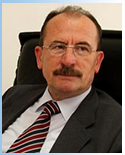According to Katerina Sinadinovska, President of the CMEM Managing Board, “hate speech is not only a violation of journalistic standards, but also a crime that can result in hate crime. Looking at hate speech in the media as a social problem, it is necessary to involve all actors to combat this phenomenon, including the instruments of the state, i.e. punishing and sanctioning.”.
“CMEM is an organization that does not impose penalties, but rather issues decisions with moral content and the battle we are wa ging with hate speech and discrimination on various grounds can be united with the ombudsman’s efforts for cooperation, precisely with respect to human rights violations”, said the President of the CMEM Appeals Commission, Mirche Adamchevski. Since the agency does not consider itself responsible for ethics in the broadcasting and print media, said Adamchevski, when it receives complaints or finds unethical behaviour, they forward the requests to us and ask us to elaborate on the matter. Last year, the Agency forwarded four complaints to the CMEM Appeals Commission. In two of them, hate speech and discrimination were determined, explained Adamchevski, adding that in the first year of the establishment of the CMEM the Ombudsman sent complaints against a number of portals.
ging with hate speech and discrimination on various grounds can be united with the ombudsman’s efforts for cooperation, precisely with respect to human rights violations”, said the President of the CMEM Appeals Commission, Mirche Adamchevski. Since the agency does not consider itself responsible for ethics in the broadcasting and print media, said Adamchevski, when it receives complaints or finds unethical behaviour, they forward the requests to us and ask us to elaborate on the matter. Last year, the Agency forwarded four complaints to the CMEM Appeals Commission. In two of them, hate speech and discrimination were determined, explained Adamchevski, adding that in the first year of the establishment of the CMEM the Ombudsman sent complaints against a number of portals.
Emilija Petreska-Kamenjarova, Head of the Department for Human Rights and Media Literacy, from the Agency for Audio and Audio Visual Media Services, stressed that hate speech is one of the important areas where the Agency can cooperate with CMEM and suggested enhancing the cooperation in cases where CMEM receives a complaint for a broadcaster. She explained that after the amendments of the Law on AAVMS from 2018, the established practice was to send all reports from the supervisions for Article 61 and the imposed measures to CMEM, to be reviewed by the Appeals Commission in terms of compliance with the Code of Journalists of Macedonia. We believe that acting in such cases is the point at which we should agree on better cooperation, maybe in the sense that when the Agency receives such complaints or when it notices problematic content ex officio, the AVMS should not analyze, but rather immediately send everything to CMEM. A number of activities are being undertaken in the field of media literacy as well, because this issue is closely related to the realization of the basic human right to freedom of expression in the media-mediated reality of the 21st century.
Marijan Ponjavic, State Adviser in the Department for Protection against Discrimination and Equal and Equitable Representation with the Ombudsman, stated that “in cases where there are elements of hate speech, the Ombudsman is prevented from acting directly, primarily because it is a criminal matter, and also due to the lack of jurisdiction to act on private sector entities that in most cases are perpetrators of hate speech or allow individuals to use their bases to spread hate speech. “Here, first and foremost, I am alluding to the media and portals, where hate speech is most pronounced and where we have repeatedly reacted indirectly, i.e. by submitting a request by instructing the CMEM to act in accordance with its competencies,” said Ponjavic. He underlined that constant education and sensitization of journalists, which would contribute to tackling this phenomenon is more than necessary.
According to Snezhana Trpevska, President of the Institute for Research on Social Development – RESIS, whenever we talk about hate speech online we should keep in mind that we are also experiencing the positive benefits from the Internet and if we call for mass sanctioning of posts on social networks it can lead to another imbalance. The principle of comprehensiveness, according to her, implies that the regulatory framework, the laws, should be supplemented with non-regulatory approaches.
